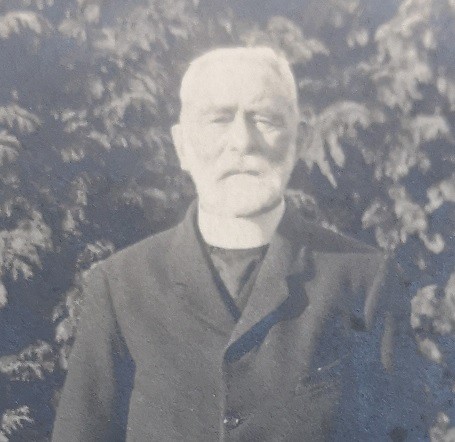RCB Library Notes
The last pre–disestablished cleric of the Church of Ireland: William Somerville–Large
A special Archive of the Month focusing on the personal story of the last member of the clergy to be ordained before Disestablishment – the Revd William Somerville–Large (1847–1939) – has been commissioned by the RCB Library as a final contribution to the 150th anniversary for 2019. The presentation is the voluntary work of historians Professor Alan Ford and Dr Miriam Moffitt who, using materials in the Library with the crucial addition of a collection of family papers loaned to the Library for this purpose by the subject’s grandson, show how one Irish clergyman responded to the tumultuous events through which he lived.

William Somerville–Large was born during the Great Famine in 1847 and had a long and eventful life which continued to his 93rd year. When he died in 1939, he was in fact the only surviving pre–Disestablishment clergyman – the last of his kind. His death had significant ramifications as it finally triggered the end of the system of paying clerical annuities which had been put in place at Disestablishment – almost 70 years after the Irish Church Act was enacted. All archbishops, bishops and permanent parish clergy were granted life annuities equal to the income they lost through the passing of the Act, commuting their incomes into a lump sum or the Commutation Fund, which in turn was paid back out to them by the RCB annually. When Somerville–Large died on the 22nd September 1939, it ended the Fund. The Journal of the General Synod published the following year in May 1940, noted how on his death, the Fund (and thus the last link with Disestablishment) was wound–up.
The presentation further reconstructs Somerville–Large’s career which began in the diocese of Cork in 1870, a year before Disestablishment kicked in, and his family connections. Deeper exploration of records in the RCB Library, together with the cache of family papers shared with the Library, enable the world to be viewed through his own eyes. A typewritten copy of his autobiography, written for his children, reveals how William reckoned that his ‘kith and kin’ easily numbered a hundred. The extensive family trees show how, at one and the same time, they saw themselves as rooted in Ireland – William’s ‘beloved country’; but also proud of their ultimately English origins. In other words, the classic Anglo–Irish conflict between loyalty to crown and country.
This tension, accentuated by partition and the creation of an independent southern state, was posed in a particularly concrete way for Somerville–Large by the execution of Kevin Barry during the War of Independence. The 20–year–old Barry had been involved in an ambush which had killed three British soldiers. Sentenced to death by court–martial, he was hanged on 1st November 1920. In a letter to the Irish Times just five days later, Somerville–Large (then aged 73) showed a remarkable capacity to stand back and take a balanced view of the tragic situation. He started by expressing his ‘whole–hearted loyalty to the Empire’. He respected ‘its right – nay its duty – to meet force with force’. So far, so unexceptional, simply reflecting the views of the vast majority of the clergy and members of the Church of Ireland, and he then went on to condemn ‘the barbarous way in which the contest is fought out now on both sides – on the weaker side, the murder of unarmed civilians and the use of expanding bullets… on the stronger side, the politically stupid and morally iniquitous treatment of captured “Republican soldiers”…’
A man of his time, and the last pre–Disestablished cleric of the Church of Ireland, William Somerville–Large’s story sheds valuable light on our past. The story may be viewed at this link.
Church of Ireland Press Office
Tel: (028/048) 9082 8880
Duty mobile: +44 (0)7774 295 369
